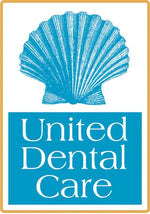Your Guide to All-On-Four Dental Implants

All-on-four dental implants changed how dentists replace a complete set of teeth. Patients now have a way more efficient, cost-effective, and long-lasting solution.
Even though the idea of using a few implant fixtures to support a full set of teeth wasn't new, the 45-degree angle used for the posterior implants (at the back of the mouth) is what led to the birth of All-on-four dental implants.
But how do these implants differ from the other types of dental implants anyway? When are All-on-four dental implants recommended?
In this article, we'll answer all possible questions about all-on-four implants.
What are All-on-four dental implants?
All-on-four dental implants use a fixed implant-supported prosthesis that replaces an entire arch of teeth with only four implants. It involves placing four titanium screws into your jawbone to support a custom-made bridge. The implants act as anchors for the bridge. Over several months, this anchor gradually integrates with the bone through osseointegration.
Once the fusion is complete, abutment posts can be placed into the anchors, enabling permanent attachment of replacement teeth.
All-on-four dental implants are a dental restoration procedure introduced in the late 1990s by a Portuguese dentist named Paulo Malo. It has since gained popularity as a reliable and effective solution for patients with extensive tooth loss.
The procedure for getting all-on-four dental implants is relatively simple and minimally invasive. According to a study, it has a 99.8% success rate, making it a popular choice for patients with complete or nearly complete tooth loss.
Got More Questions?
How do All-on-four dental implants work?
You may be wondering what the process entails from start to finish. Here's a comprehensive guide to walk you through every step of the All-on-Four procedure, from your initial consultation to your post-operative recovery.
Step 1: Initial Consultation
During the initial consultation for all-on-four dental implants, the dentist will evaluate the patient's oral health and examine their remaining teeth and gums.
They will also review the patient's medical history to ensure they are a suitable candidate for the procedure. To qualify for the procedure, the patient:
- Must have sufficient bone density in the jaw
- Have lost or damaged most of his or her teeth in a dental arch
- Should be 18 years old and above
- No existing medical conditions (e.g., uncontrolled diabetes or autoimmune disorders)
The dentist may take x-rays and impressions of the patient's mouth to create a treatment plan tailored to the patient’s individual needs.
The consultation is also an opportunity for the patient to ask questions and discuss any concerns about the procedure or the recovery process.
Step 2: Treatment planning
Once the patient has been deemed a good candidate for the All-on-four procedure, the dentist will create a treatment plan. This step involves designing the prosthetic teeth and determining the optimal placement of the dental implants in the jaw.
Step 3: Implant placement
The procedure involves the placement of four dental implants in the jawbone through major surgery. This part is typically done under local anesthesia or sedation to ensure the patient's comfort during the procedure. The process takes a few hours and can be completed in one day. After the surgery, patients should expect some swelling, bruising, and discomfort.
Before the surgery, you will be asked to do the following:
- Fast
- Bring a family member or a friend to accompany you to the clinic
- Stock up with the right food at home
- Wear comfortable clothes
- Avoid smoking before the procedure
Step 4: Healing period
After the implants are placed, the patient must undergo a healing period of two to four months to allow the implants to fuse with the surrounding bone tissue.
Step 5: Prosthetic teeth placement
Once the implants have healed, the patient will return to the dental office to have the final prosthetic teeth placed. These teeth are custom designed (made of acrylic or porcelain) to match the patient's natural teeth. They will be secured in place using abutments and screws.
Step 6: Post-operative care
After the procedure is complete, patients must follow strict post-operative care. This step may include using a special mouthwash, avoiding hard or sticky foods, and attending regular follow-up appointments to monitor the healing process and adjust the prosthetic teeth as needed.
With proper care and maintenance, an All-on-four dental implant can last up to 20 years and sometimes even a lifetime.
All-on-four vs. Other Dental Implant Types
With the information above, what makes all-on-four a better tooth replacement option? To help you more in deciding, we'll look at how all-on-four dental implants compare with other dental implant types, such as implant-supported dentures and full-mouth dental implants.
We'll also discuss some pros and cons of All-on-four dental implants.
Let’s start with their advantages:
Sturdier
The All-on-four dental implant is a more stable teeth replacement option than dentures or implant-supported dentures, which often have stability issues. It achieves this firmness by strategically placing four implants in the jawbone to support the replacement teeth. This ensures excellent stability and reduces the risk of problems arising from using dentures or implant-supported dentures that rely on only two or none.
Quicker and Less Invasive Procedure
Other implant procedures, such as full mouth implants, require six or more implants and dental appointments to achieve the desired result. On the other hand, All-on-four only needs four implants and can be done in just one day, making it a quicker and less invasive procedure. It is less invasive because it reduces the need for extensive bone grafting procedures often required with traditional implants.
Cost-effective compared to other dental implants
Since all-on-four only needs four implants and can be done in one day, it is a cheaper yet reliable type of dental implant. All-on-4 dental implants are priced around $12,000 to $50,000. In contrast, a full set of permanently installed implants can cost around $45,000 – $60,000.
When you talk about disadvantages, all-on-four implants also have a few.
Discomfort
Chewing and speaking can sometimes be painful during the early stages of the healing process. It causes discomfort because the implant process involves drilling into the gums and jawbone, unlike dentures. However, these issues will be gone eventually through practice and when the implants are fully healed.
Potential for implant failure
While All-on-4 implants have a 99 % success rate, implant failure is still possible. If one of the four implants fails, the entire prosthesis may need to be replaced or modified, which can be costly and time-consuming.
How much do all-on-four dental implants cost?
The cost of All-on-four dental implants can vary depending on several factors, such as location, the dentist's experience, the procedure's complexity, and the materials used. Additional costs may include necessary extractions, bone grafting, or other preparatory procedures. As mentioned, all-on-four implants can range from $12,000 to $50,000.
It's also important to remember that dental insurance may only cover some procedure costs. However, many dental practices offer financing options, such as payment plans or financing through third-party companies, to help make the procedure more affordable.
It's best to schedule a consultation with a dental professional to determine the exact cost of your dental implant.
Get 15 % Off on Your Dental Implant With Our Exclusive Membership Offers
Recovery and Aftercare
The recovery and aftercare for All-on-four dental implants may vary depending on the case. Your dental professional can provide specific instructions and recommendations to ensure your recovery and prevent any possible complications that might occur.
Here are some general guidelines for recovery and aftercare:
Follow post-operative instructions
These instructions may include recommendations for managing pain, swelling, and bleeding and instructions for eating, drinking, and caring for your implants.
Sample directives may include:
- Resting and taking things easy for the first 72 hours following the surgery
- Getting guidance in events of light-headedness, dizziness, and sleepiness following surgery
- Refraining from putting too much force on the surgical sites
Take prescribed medications
After the procedure, your dentist may prescribe pain relievers or antibiotics to help manage pain and prevent infection. It's essential to take these medications as prescribed and not to skip any doses.
Dentists might recommend Vicodin®, Norco®, or Ibuprofen for pain medication. It is recommended to take Vicodin/Norco as needed every 4-6 hours to manage pain. It is also essential to stay on schedule with the medication to prevent pain from worsening.
Adults may also take up to 800 mg of Ibuprofen (Motrin or Advil) every 6 hours for a short period in conjunction with Vicodin.
Avoid certain foods
You should avoid eating hard, crunchy, or chewy foods such as gummy bears and candies because they can put too much pressure on your implant. You should also avoid hot, spicy, or acidic foods or even alcoholic beverages and cigarettes that can irritate your gums and mouth.
Practice good oral hygiene
Brush your teeth at least twice a day and floss daily. Your dental professional may also recommend using an antimicrobial mouthwash to reduce the risk of infection.
Attend follow-up appointments
Follow-up consultations with your dental professional are crucial for several reasons:
Firstly, these consultations allow your dentist to monitor the healing process of your implants and ensure that they are integrating properly with your jawbone. Any issues or complications that may arise can be promptly identified and treated, which can help prevent more severe problems down the line.
Secondly, these consultations allow your dental professional to check the fit of your prosthetic teeth and make any necessary adjustments. This ensures your new teeth are comfortable, functional, and aesthetically pleasing.
Lastly, follow-up consultations let you ask any questions about your implants or the care and maintenance of your new teeth.
Possible Complications and Risks
Like any surgical procedure, all-on-four dental implants have risks and potential complications. However, the risks associated with this procedure are generally low, and most patients experience a successful outcome.
Nonetheless, awareness of these issues is still vital for oral health.
Infection
One of the most common risks associated with all-on-four dental implants is infection. Because the implants involve surgery, the risk of infection will always be present.
Fortunately, several steps can be taken to minimize the risk of infection after the procedure. These may include rinsing with an antibacterial mouthwash, avoiding certain foods, and taking antibiotics.
Warning signs of infection to watch out for include fever, severe pain, or discharge from the implant site. If you experience these symptoms, you must contact your dentist immediately to seek treatment.
Nerve damage
During the implant placement procedure, there's a risk of injuring the nerves that run through the jawbone. The good news is nerve damage is a relatively rare (1%) complication of all-on-four dental implants.
Additionally, advances in technology and imaging techniques have made it easier to plan implant placement precisely, reducing the risk of nerve damage.
Allergic reactions
While rare, it's possible to have an allergic reaction to the materials used in all-on-four dental implants, such as titanium or acrylic resin. Symptoms of an allergic reaction can include itching, swelling, rash, and difficulty breathing.
That’s why initial consultations are crucial. If you have a known allergy to materials used in all-on-four dental implants, discuss this with your dentist before the procedure to avoid any problems.
Bone loss
In some cases, bone loss can occur after the all-on-four dental implant procedure due to various factors, such as poor oral hygiene, gum disease, or smoking.
Bite problems
All-on-four dental implants can result in bite problems if the implant is not placed correctly or if the prosthetics are not fitted. Bite problems can include difficulty biting, chewing, or speaking, as well as discomfort or pain in the jaw or teeth.
Sinus problems
All-on-four dental implants placed in the upper jaw may occasionally cause sinus problems. It can happen if the implants protrude into the sinus cavities or if insufficient bone supports the implants in the upper jaw. Sinus problems can include pressure, pain, congestion, and even infections.
To minimize the risk of sinus problems, your dentist may use advanced imaging and planning techniques to determine the appropriate placement of the implants.
Final Thoughts and Recommendations
All-on-four is a game-changer in restorative dentistry. It is a cost-efficient, less invasive, and time-saving option compared to traditional implant types.
To achieve the optimal result for an All-on-four dental implant, you must strictly prepare yourself before the procedure and follow your dentist's aftercare instructions. These actions will not only prevent any possible problem from happening but will also help your implant last longer.
We also pointed out that All-on-four implants are not without possible risks and complications. Although extremely rare, it's essential to be aware of these risks to avoid further dental problems.
Nonetheless, with a trusted implantologist or dental professional, everything should go according to plan.
Get Your Smile Back with All-on-Four Dental Implants
If you live in Culver City and need an efficient and cost-effective All-on-four dental implant procedure, book an appointment now, or visit our office at 3909 South Sepulveda Blvd Culver City, CA 90230.
Our dentists also serve patients in Marina Del Rey, Playa Del Rey, Inglewood, Venice, and other adjacent cities.
What are you waiting for? Don’t let missing teeth hold you back any longer. With all-on-four dental implants, you can enjoy the freedom and confidence of a fully functional smile.






